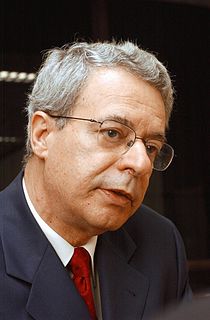A Quote by Paulo Freire
Dehumanization, although a concrete historical fact, is not a given destiny but the result of an unjust order that engenders violence in the oppressors, which in turn dehumanizes the oppressed
Related Quotes
But almost always, during the initial stage of the struggle, the oppressed, instead of striving for liberation, tend themselves to become oppressors, or sub oppressors. The very structure of their thought has been conditioned by the contradiction of the concrete, existential situation by which they were shaped. Their ideal is to be men; but for them to be men is to be oppressors
How can the oppressed, as divided, unauthentic beings, participate in developing the pedagogy of their liberation? Only as they discover themselves to be 'hosts' of the oppressor can they contribute to the midwifery of their liberating pedagogy. As long as they live in the duality in which to be is to be like and to be like is to be like the oppressor, this contribution is impossible. The pedagogy of the oppressed is an instrument for their critical discovery that both they and their oppressors are manifestations of dehumanization.
With the establishment of a relationship of oppression, violence has already begun. Never in history has violence been initiated by the oppressed. How could they be the initiators, if they themselves are the result of violence? How could they be the sponsors of something objective whose objective inauguration called forth their existence as oppressed? There would be no oppressed had there been no prior of violence to establish their subjugation.
The object of a dialogical-liberterian action is not to 'dislodge' the oppressed from a mythological reality in order to 'bind' them to another reality. On the contrary, the object of dialogical action is to make it possible for the oppressed, by perceiving their adhesion, to opt to transform an unjust reality." "In order for the oppressed to unite they must first cut the umbilical cord of magic and myth which binds them to the world of oppression; the unity which links them to each other must be of a different nature.
Cats are oppressed, dogs terrify them, landladies starve them, boys stone them, everybody speaks of them with contempt. If they were human beings we could talk of their oppressors with a studied violence, add our strength to theirs, even organize the oppressed and like good politicians sell our charity for power.
But the poor person does not exist as an inescapable fact of destiny. His or her existence is not politically neutral, and it is not ethically innocent. The poor are a by-product of the system in which we live and for which we are responsible. They are marginalized by our social and cultural world. They are the oppressed, exploited proletariat, robbed of the fruit of their labor and despoiled of their humanity. Hence the poverty of the poor is not a call to generous relief action, but a demand that we go and build a different social order.



























